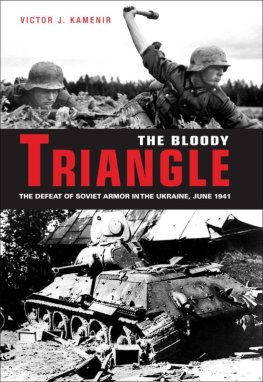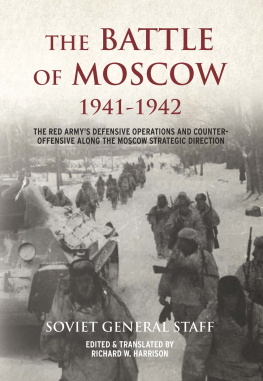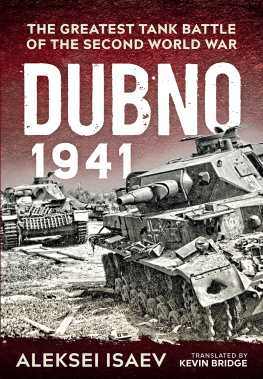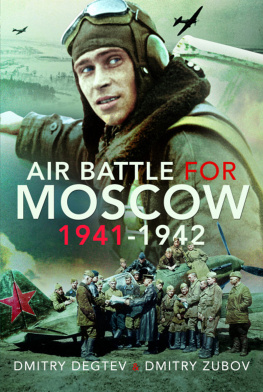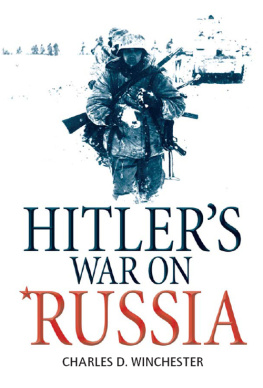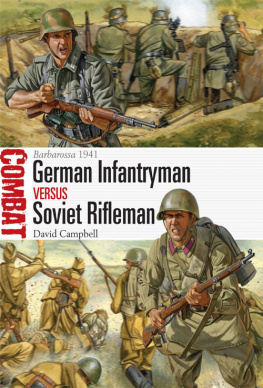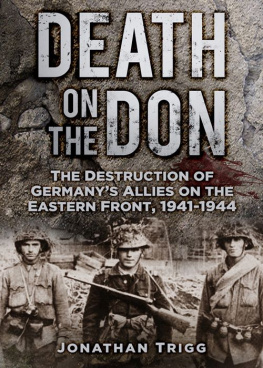The right of Jack Radey and Charles Sharp to be identified as Authors of this Work has been asserted by them in accordance with the Copyright, Designs and Patents Act 1988.
A CIP catalogue record for this book is available from the British Library.
All rights reserved. No part of this book may be reproduced or transmitted in any form or by any means, electronic or mechanical including photocopying, recording or by any information storage and retrieval system, without permission from the Publisher in writing.
Pen & Sword Books Ltd incorporates the Imprints of Pen & Sword Aviation, Pen & Sword Family History, Pen & Sword Maritime, Pen & Sword Military, Pen & Sword Discovery, Wharncliffe Local History, Wharncliffe True Crime, Wharncliffe Transport, Pen & Sword Select, Pen & Sword Military Classics, Leo Cooper, The Praetorian Press, Remember When, Seaforth Publishing and Frontline Publishing
Foreword
By David M. Glantz
The SovietGerman War (19411945), known in the West as Hitlers War on Germanys Eastern Front during World War II, and to Russians as The Great Patriotic War, stands like a colossus astride the history of the twentieth century. The vast scale of the war, coupled with its unmatched ferocity and the human and material carnage it produced, has challenged the descriptive power of historians who have written about it and tested the imagination of readers who have attempted to comprehend it. Many past histories of the war have added to this confusion because they were marred by Cold War biases, the self-serving recollections of participants in the war, or, as was the case with many of the hundreds of histories written in the Soviet Union, appreciations designed to bolster the superiority of a political, economic and social system. Whatever the cause, these histories are replete with myth, legend, and outright inaccuracies, which have not only obscured or utterly concealed large segments of the war from the readers view but have also perverted accounts of those portions of the wartime narrative relatively well known to contemporary readers.
Thankfully, however, the fading of the Cold War fears and animosities, coupled with the death of most participants in the war and the waning of ideological struggles characterizing the postwar years, has been accompanied by unprecedented releases of documentary materials from the once-locked archives of the Soviet Union. Today, by exploiting these new materials and re-examining documents from archives long-open but poorly exploited, a new generation of historians is slowly lifting the veil of inaccuracy and misunderstanding that has cloaked and obscured our understanding of the war. This new book by Jack Radey and Charles Sharp stands at the forefront of this vitally important process.
The Defense of Moscow: the Northern Flank is revisionist history at its best. It describes but a single aspect of the famous battle for Moscow, which, together with Stalingrad, Kursk and Berlin, is familiar to even the most casual readers of the histories of the war. This book demolishes myths and legends, replacing them with fresh and accurate insights as to how this battle, long famous as the first defeat suffered by Hitlers vaunted Wehrmacht, was actually fought and won by the soldiers and commanders of Stalins Red Army. Without stealing the thunder of Radeys and Sharps book, by unearthing, exploiting, and studying newly released archival materials, the two historians clearly demonstrate why and how the battle for Kalinin was fought. In the process, their study has shown how this fight, which historians have long treated as a mere side-show to the culminating stage of Operation Barbarossa, was, in reality, an important element in the German High Commands strategy for defeating the Red Army, capturing Moscow, and, ultimately, winning the war.
By skillfully exploiting newly released and long-neglected archival materials, the authors of this clear, concise, and well-written book have provided not only fresh insights as to how and why the battle for Moscow was fought, but also the necessary context for understanding why Germany ultimately lost the war. It is a must read for historian and layman alike. I hope this is but the first of many books penned by these historians.
David M. Glantz, Carlisle, PA
Authors Notes
Two issues confront a historian in any exploration of the Great Patriotic War, as the Soviets referred to it. The first is finding appropriate maps, and the second is language. Well take them in order.
Maps
The Germans went to war not only without a good intelligence picture of their opponents (they underestimated the Red Army by a factor of three, and totally misunderstood the Soviet ability to mobilize resources), but also without adequate maps of the country they were to invade. Using outdated 1:300,000 scale maps, they found themselves operating with great difficulty and being regularly surprised by the terrain. While maps were captured in small batches during 1941, it was not until the capture of the headquarters of 2nd Shock Army in 1942 that the Germans acquired a full, up-to-date map set of the western USSR. The Soviets, who by doctrine had assumed they would be fighting on their opponents soil, lacked much in the way of good maps for the territory they had acquired in 1939, and were only on the map once they were pushed back into the pre-war USSR territory.
A modern historian has to deal with trying to find maps that roughly date from the period to be studied. The best complete set of maps available to most readers is the US Army set of 1:250,000 maps issued in 1954. Fortunately these can be accessed online at http://www.lib.utexas.edu/maps/ams/easterneurope/ thanks to the University of Texas . The maps are not complete; some villages are not named, and some have different names than were used at the time. Other villages were destroyed during the war, and there is some new construction shown on the maps that was not there during the war. Nonetheless, these are the most useful. Other sources that can supplement them include a collection of aerial photographs taken by the Luftwaffe during the war. They can be found at http://www.wwii-photos-maps.com/ under the heading target dossiers. Some libraries have collections of maps at other scales that were captured from the Soviets by the Germans , and then captured by the American or British Armies during the war.
Language
Translating German presents relatively few challenges. At least the alphabet is pretty much the same. Russian, on the other hand, is written in Cyrillic. There are at least four different ways to transliterate Cyrillic into English. Is it Tsar Alexander or Czar Aleksander? General Rokossovsky or General Rokossovskii? Josef Stalin or Iosef Stalin? The system that is most familiar to the principal author of this work is the old-fashioned one used by Progress Publishers, the Soviet outlet for English translations of works in Russian. Consequently this one was used pretty much throughout the book. The principal researcher, on the other hand, learned a method used by the US Army in the early 1950s, which has since been superceded by yet another one. The Germans, naturally, transliterated Cyrillic names into German, producing yet another set of spellings, similar to the previous three, but different. The authors have made every attempt to be consistent throughout, but inconsistencies may remain.



